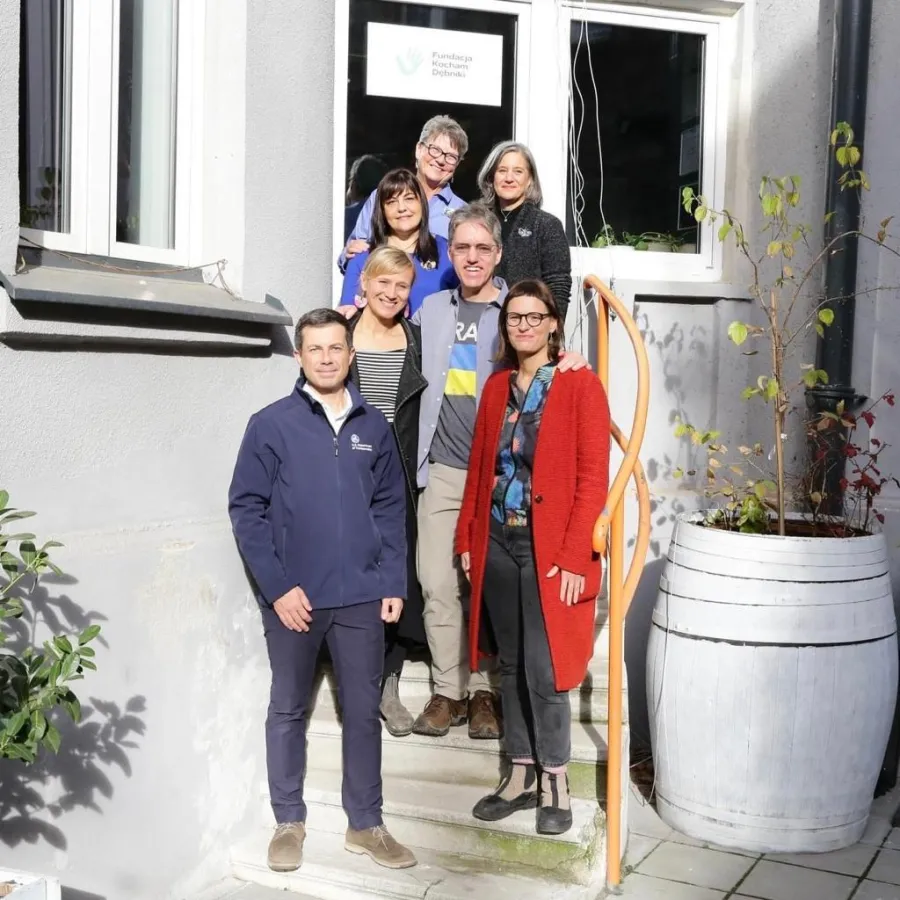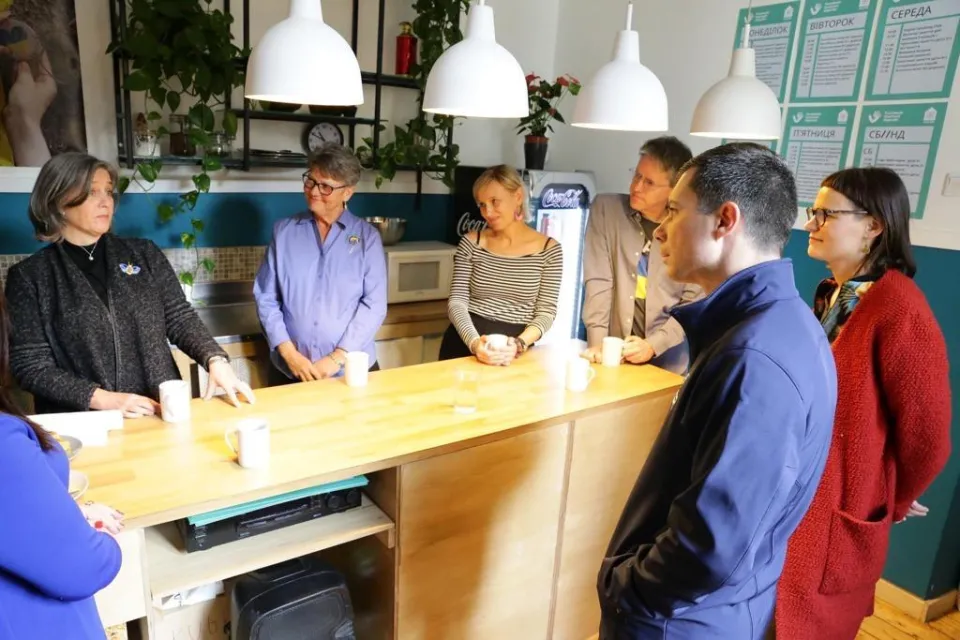‘The Power to Change Through Communities’
Alum News
Amy Pollack Kemp ’87 co-founds a community center that is helping Ukrainian women and children heal and rebuild their lives in the midst of war
Kemp, top right, and the rest of the Świetlica Dębniki Community Center team during a visit from former United States Secretary of Transportation Pete Buttigieg.
Published April 30, 2025
Why not me?
It’s a question Amy Pollack Kemp ’87 learned to ask herself during her time at Smith, and one that eventually played a pivotal role in the creation of the Świetlica Dębniki Community Center in Krakow, Poland, which offers women and children displaced by the ongoing war in Ukraine a place to safely heal, grow, and rebuild.
“One of the things Smith gave me is a really deep feeling of personal value and the fact that everybody matters,” Kemp says. “Smith taught me to ask, ‘Why not me? Why shouldn’t I be the one to step up and do this?’”
Those particular questions nagged at Kemp as she watched from afar the devastation that followed Russia’s 2022 invasion of Ukraine. Little did Kemp know that the answer to her questions about what role she could play would take the form of a center that would ultimately serve as a second home for the thousands of women and their children displaced by the war and seeking a close-knit community for comfort and support.
Kemp’s road to Krakow was unexpected. She transferred to Smith from NYU as a sophomore, pursuing a double major in anthropology and theatre. After graduation, she wound up in the world of sports and entertainment marketing, a field where she had to be, in her words, “particularly good at managing high-performing teams under very stressful situations.”
Her agency primarily looked after major international corporate sponsors during soccer World Cups, European championships, and the Olympics. Because several European championship games were happening in underdeveloped Ukrainian cities a few years ago, Kemp’s team collaborated with local agencies to ensure the events offered a high-caliber experience for the thousands of guests attending different matches.
“I hired partner agencies in Ukraine and Poland to help us with those events, and we’d been working with each other for years leading up to them,” Kemp explains. “The principals of these agencies, you get to know them and the people within their organizations, and they become trusted partners.”
When news of the invasion broke, Kemp first checked in on folks from her partner agencies, who were working together to bus people from the Poland–Ukraine border and find them help.
While Kemp had been relieved to hear that her colleagues were safe, she also felt the desire to lend her assistance and expertise to the relief efforts in a more tangible way, but wasn’t sure how.
The first opportunity to do so came from an unlikely place: a Facebook message from a man named Bart.
“I didn’t remember him, but he remembered me,” Kemp recalls, explaining that he had been a driver for her in Gdansk, one of the Polish cities she’d worked with. “He reached out and asked if I could get him some two-way radios for folks to use across the border. I immediately called our supplier and made that happen for him.”
Kemp, far left, talks with former United States Secretary of Transportation Pete Buttigieg about her team’s work.
Soon afterwards, Kemp and her cousin traveled to Krakow to offer more hands-on help and were introduced to Olga Piasecka-Nieć and her friend Lucy. The two women had put their day jobs on pause to pool resources, rally their communities, and support the women and children displaced due to the war.
One of those displaced women was Lena Mykhailova. One of 260 Ukrainians who were given shelter in the homes of Piasecka-Nieć and her neighbors, Mykhailova and her family quickly became what Kemp describes as the linchpins within the Ukrainian community at the center.
“I’m amazed at how much I’ve changed since arriving here [three years ago], and how much I’ve seen this place transform people’s lives,” says Mykhailova. “Our community center shows how important it is to contribute to a world where women have the tools and strengths to transform their lives and build healthy communities for the future.”
When Piasecka-Nieć and Kemp first met, Piasecka-Nieć’s work was rooted in spreadsheets, with most of her communication being done through a Facebook group. It became clear that the needs of the Ukrainian women would soon outpace Piasecka-Nieć’s capacity to help, and the idea for a community center with a progressive focus on healing, thriving, and paying it forward began to take shape.
“There was a moment of them thinking, ‘Are these people for real? They’re too good to be true, coming from America and trying to help us,’” Kemp recalls of their earliest meetings. “And we had the same moment, asking ourselves, ‘Are these people for real? They’re too good to be true, dropping everything in their lives to help these women in Ukraine.’”
The moment passed quickly as the women discussed their common goal. They were joined by Cindy Henson, a retired executive, business consultant for nonprofits, and humanitarian who flew into Krakow and helped determine how they would raise the money for the community center, where it would be located, and what services it would provide. After a whirlwind 10 weeks, a lease was signed, and the Świetlica Dębniki Community Center became a reality.
“We’ve become part of a movement that’s strengthening and empowering women who didn’t know they had that strength,” says Henson.
Since its inception, the Świetlica Dębniki Community Center has grown from offering food, clothing, and hygiene products to providing psychological support, childcare, language classes, and other workshops and opportunities for connection, growth, and healing. Kemp and Henson take regular trips to Krakow to assist with fundraising and any organizational challenges that may arise, while Piasecka-Nieć and Mykhailova (who, since first arriving in Krakow, has taken on the role of Ukrainian community ambassador at the center) are responsible for the more direct needs that require boots on the ground.
“What began as a lifeline has evolved into a thriving, supportive community for all of us,” says Mykhailova. “It goes to show that more than anything, when women work together, when we all look in the same direction, we have the power to change our communities.”
The center’s impact has been profound. So far, nearly 8,000 women and 1,400 families have visited the community center and food pantry. Nearly two dozen new programs—from support groups for parents to yoga and Polish lessons—have been added. Former United States Secretary of Transportation Pete Buttigieg recently visited the center and commended Kemp, Piasecka-Nieć, Mykhailova, Henson, and the rest of the team for their invaluable efforts and deep understanding of what’s required to rebuild communities in Ukraine.
When asked what she hopes the center’s legacy will be, Kemp has a quick answer: the workshops, trainings, psychosomatic integration, support groups, and other resources offered through the center’s Community Lab initiative. “It’s simple, but it’s not easy—I want people to continue using the community to build societal bonds,” she says. “I hope that when these women are able to return home or decide to move somewhere else, that the Community Lab is there to support them, and that they’re able to continue the work and spirit of the community center wherever they go.”

